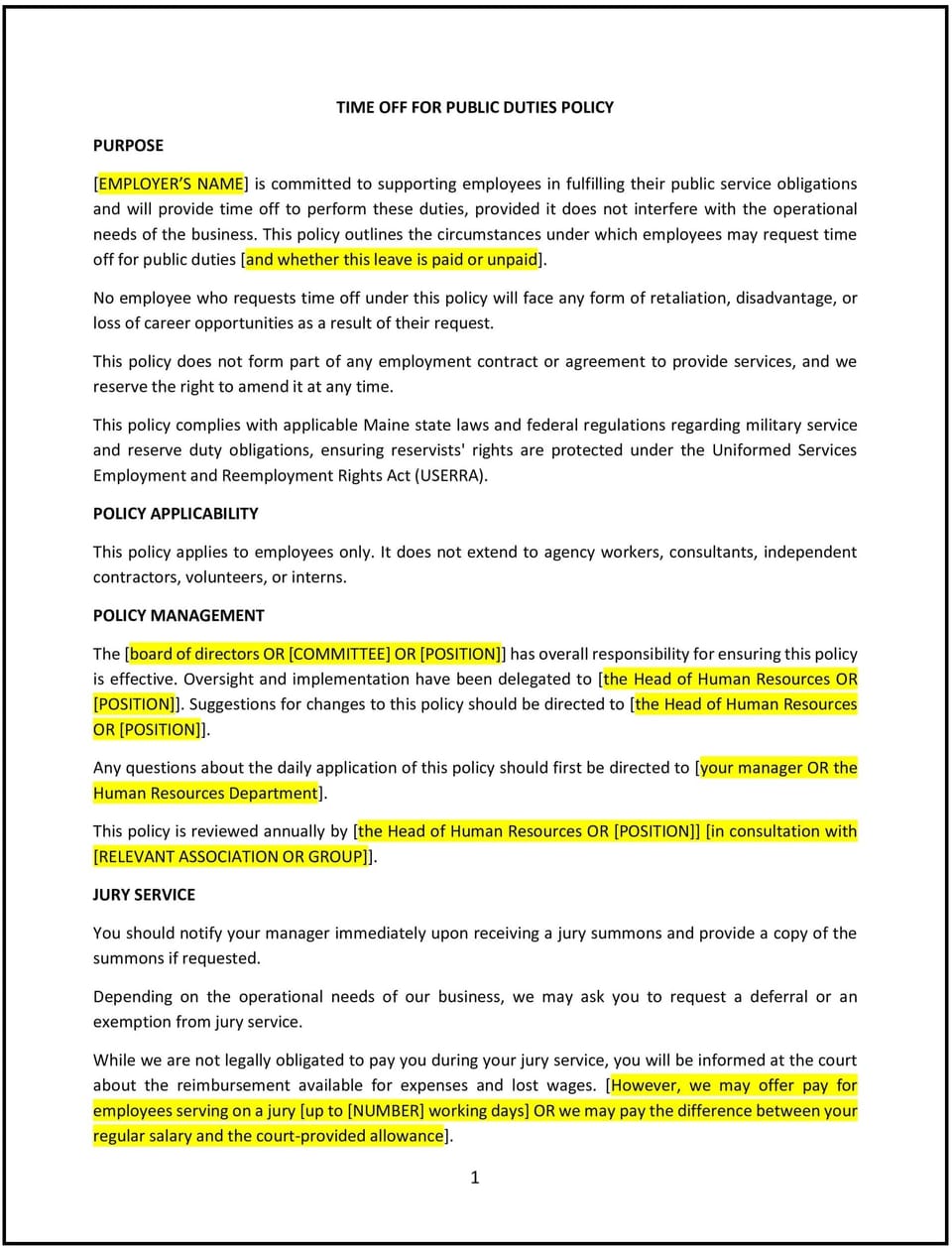Time off for public duties policy (Maine): Free template

Time off for public duties policy (Maine): Free template
This time off for public duties policy is designed to help Maine businesses comply with state laws that grant employees time off to perform certain public duties, such as jury duty, serving as a witness, or other civic responsibilities. It outlines the company’s approach to providing time off for public duties, while ensuring that business operations continue smoothly and that employees are aware of their rights and obligations.
By implementing this policy, Maine businesses can support legal compliance, maintain fair treatment of employees, and support civic engagement without disrupting work operations.
How to use this time off for public duties policy (Maine)
- Define eligible public duties: Clearly explain which public duties are covered under this policy, such as jury duty, serving as a witness, attending school board meetings, or other civic or governmental roles.
- Set notification requirements: Specify how employees should notify the business about their need for time off for public duties, including the required notice period and any documentation (e.g., jury summons).
- Address pay during public duties: Clarify whether the time off will be paid or unpaid. While Maine law does not require employers to pay employees for time off for public duties, businesses can choose to offer paid time off as a benefit.
- Define duration and frequency of leave: Specify how much time off is granted for public duties and any limitations, such as the maximum number of days allowed per year.
- Explain job protection: Ensure employees that they will retain their job and return to the same or an equivalent position after their time off for public duties.
- Provide guidelines for handling workload: Establish procedures for employees to coordinate their absence, including how work should be managed in their absence (e.g., temporary coverage, delegation of tasks).
- Review regularly: Update the policy as necessary to reflect changes in Maine state laws, federal regulations, or business needs.
Benefits of using this time off for public duties policy (Maine)
Implementing this policy provides several benefits for Maine businesses:
- Ensures compliance: Aligns with Maine’s laws regarding time off for public duties, helping businesses stay in compliance and avoid legal penalties.
- Promotes civic responsibility: Supports employees’ rights to fulfill civic duties without the fear of losing their job or income.
- Enhances employee morale: Demonstrates the company’s commitment to fairness and respect for employees' civic duties, boosting employee satisfaction and trust.
- Reduces disruption: Provides a clear structure for managing employee absences due to public duties, minimizing operational disruptions.
- Demonstrates fairness: Ensures that all employees are treated equitably when they request time off for public duties, preventing discrimination or inconsistency.
Tips for using this time off for public duties policy (Maine)
- Communicate clearly: Ensure that all employees are aware of the policy, including how to request time off for public duties, during onboarding and in the employee handbook.
- Keep records: Maintain accurate records of all requests for time off for public duties, including the dates of leave and any supporting documentation, to ensure transparency and compliance.
- Plan ahead: Encourage employees to notify the business as early as possible when they need time off for public duties, allowing enough time to make arrangements for coverage.
- Be consistent: Apply the policy consistently across all employees to avoid perceptions of favoritism or bias in granting time off for public duties.
- Stay updated: Regularly review changes to Maine state laws or federal regulations regarding public duties to ensure that the policy remains up to date and compliant.
Q: What types of public duties are covered under this policy?
A: This policy covers public duties such as jury duty, serving as a witness, participating in school board meetings, or other civic or governmental roles, as defined by Maine law.
Q: How should employees notify the business about needing time off for public duties?
A: Employees should notify their manager or HR as soon as possible, providing any necessary documentation (e.g., jury summons) to confirm their public duty obligations.
Q: Is time off for public duties paid?
A: Maine law does not require businesses to pay employees for time off for public duties. However, businesses may choose to offer paid leave as a benefit, which should be clearly outlined in the policy.
Q: How much time off is granted for public duties?
A: The amount of time off depends on the specific public duty, with employees generally entitled to take time off as needed for jury duty or other public obligations. The policy may specify limitations, such as a maximum number of days per year.
Q: Will employees be protected from retaliation for taking time off for public duties?
A: Yes, employees are entitled to take time off for public duties without fear of retaliation. They will retain their job and be allowed to return to the same or an equivalent position after their leave.
Q: How can businesses manage employee absences for public duties?
A: Businesses should encourage employees to notify them as early as possible, allowing time to arrange for temporary coverage or the delegation of tasks to minimize disruption during the absence.
Q: How often should businesses review their time off for public duties policy?
A: Businesses should review the policy annually or whenever there are updates to Maine labor laws or changes in business needs that affect time off for public duties.
This article contains general legal information and does not contain legal advice. Cobrief is not a law firm or a substitute for an attorney or law firm. The law is complex and changes often. For legal advice, please ask a lawyer.


